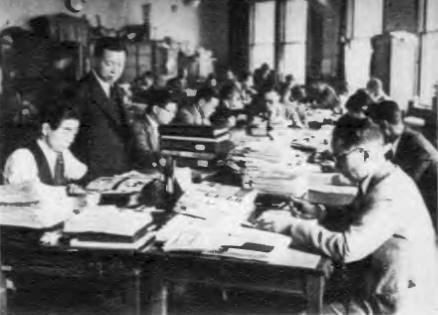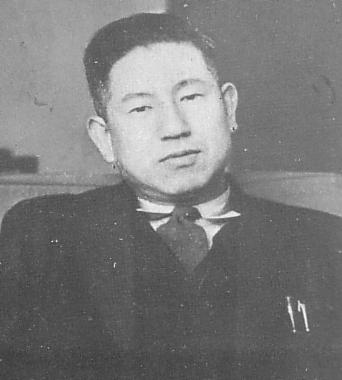Peace Preservation Law on:
[Wikipedia]
[Google]
[Amazon]
The was a Japanese law enacted on April 22, 1925, with the aim of allowing the Special Higher Police to more effectively suppress socialists and communists. In addition to criminalizing forming an association with the aim of altering the ''
 In 1927, a sub-bureau, the "Thought Section," was established within the Criminal Affairs Bureau of the Special Higher Police within the
In 1927, a sub-bureau, the "Thought Section," was established within the Criminal Affairs Bureau of the Special Higher Police within the  From 1925 through 1945, over 70,000 people were arrested under the provisions of the Peace Preservation Law, but only about 10% reached trial, and the death penalty was imposed on only two offenders, spy
From 1925 through 1945, over 70,000 people were arrested under the provisions of the Peace Preservation Law, but only about 10% reached trial, and the death penalty was imposed on only two offenders, spy
online
* Mitchell, Richard H. ''Thought Control in Prewar Japan'', Cornell University Press, 1976 {{Authority control 1925 in law Anti-communism in Japan Legal history of Japan Political repression in Japan Politics of the Empire of Japan Japanese legislation
kokutai
is a concept in the Japanese language translatable as " system of government", "sovereignty", "national identity, essence and character", "national polity; body politic; national entity; basis for the Emperor's sovereignty; Japanese constitu ...
'' ("national essence") of Japan, the law also explicitly criminalized criticism of the system of private property, and became the centerpiece of a broad apparatus of thought control in Imperial Japan. Altogether more than 70,000 people were arrested under the provisions of the Peace Preservation Law between 1925 and its repeal by American Occupation authorities in 1945.
Passage
Following the Russian Revolution of 1917, socialist and communist ideas began spreading in Japan, and the government became increasingly concerned that socialism and communism represented a threat to the emperor system and Japan's divine ''kokutai'' (国体, "national essence"). The 1918 Rice Riots and the assassination of Prime Minister Hara Kei only deepened concerns that dangerous ideas were spreading through society. Efforts to pass a Peace Preservation Law began within the Diet as early as 1921, and gathered momentum after the formation of theJapan Communist Party
The is a left-wing to far-left political party in Japan. With approximately 270,000 members belonging to 18,000 branches, it is one of the largest non-governing communist parties in the world.
The party advocates the establishment of a democr ...
in 1922, although opposition to the law remained strong. Finally, the law was passed in 1925, in conjunction with the passage of the Universal Manhood Suffrage Law, which allowed all male citizens to vote in elections, regardless of wealth or status. Fears that newly enfranchised working-class voters might vote for socialists or communists played an important role in overcoming earlier opposition to the law.
Provisions
The law provided:Richard H. Mitchell, "Japan's Peace Preservation Law of 1925: Its Origins and Significance." Monumenta Nipponica (1973): 317-345.Anyone who has formed an association with the aim of altering the ''By using the highly vague and subjective term ''kokutai'', the law attempted to blend politics and ethics, but the result was that any political opposition could be branded as "altering the ''kokutai''". Thus the government had ''kokutai is a concept in the Japanese language translatable as " system of government", "sovereignty", "national identity, essence and character", "national polity; body politic; national entity; basis for the Emperor's sovereignty; Japanese constitu ...'' or the system of private property, and anyone who has joined such an association with full knowledge of its object, shall be liable to imprisonment with or without hard labor, for a term not exceeding ten years.
carte blanche
A blank cheque in the literal sense is a cheque that has no monetary value written in, but is already signed. In the figurative sense, it is used to describe a situation in which an agreement has been made that is open-ended or vague, and therefo ...
'' to outlaw any form of dissent.
Consequences
 In 1927, a sub-bureau, the "Thought Section," was established within the Criminal Affairs Bureau of the Special Higher Police within the
In 1927, a sub-bureau, the "Thought Section," was established within the Criminal Affairs Bureau of the Special Higher Police within the Home Ministry
An interior ministry (sometimes called a ministry of internal affairs or ministry of home affairs) is a government department that is responsible for internal affairs.
Lists of current ministries of internal affairs
Named "ministry"
* Ministr ...
in order to make use of the new legal authority granted by the Peace Preservation Law to ferret out and suppress subversive ideologies. The new "Thought Police" established local branches throughout Japan as well as in Japan's overseas territories to monitor dangerous thoughts and ideologies among Japan's imperial subjects. A "Student Section" was also established within the Ministry of Education
An education ministry is a national or subnational government agency politically responsible for education. Various other names are commonly used to identify such agencies, such as Ministry of Education, Department of Education, and Ministry of Pub ...
to monitor subversive thought among university professors and students. Within the Ministry of Justice, special were appointed to suppress .
Renewed underground activity by the banned Japan Communist Party
The is a left-wing to far-left political party in Japan. With approximately 270,000 members belonging to 18,000 branches, it is one of the largest non-governing communist parties in the world.
The party advocates the establishment of a democr ...
in 1928 led to the March 15 incident, in which police arrested more than 1,600 Communists and suspected Communists under the provisions of the Peace Preservation Law. The same year, the highly anti-Communist government of Tanaka Giichi pushed through an amendment to the law, raising the maximum penalty from ten years to death.
By 1933, coerced " ideological conversions" (転向, ''tenkō'') had become the main means of enforcing the Peace Preservation Law, rather than judicial punishment. In order to elicit ''tenkō'' from prisoners suspected of ideological radicalism, the police employed physical torture, as well as psychological torture and familial pressure.
In the 1930s, with Japan's increasing militarism
Militarism is the belief or the desire of a government or a people that a state should maintain a strong military capability and to use it aggressively to expand national interests and/or values. It may also imply the glorification of the mili ...
and totalitarianism
Totalitarianism is a form of government and a political system that prohibits all opposition parties, outlaws individual and group opposition to the state and its claims, and exercises an extremely high if not complete degree of control and regu ...
, dissent was tolerated less and less. In early February 1941, the original Peace Preservation Law of 1925 was heavily amended to make punishments even more severe. Terms for people suspected of socialist and communist sympathies were made harsher, and for the first time religious organizations were included within the purview of the Thought Police. In addition, the appeals court for thought crimes was abolished, and the Ministry of Justice given the right to appoint defense attorneys in cases of thought crime. The new provisions became effective on May 15, 1941.
Richard Sorge
Richard Sorge (russian: Рихард Густавович Зорге, Rikhard Gustavovich Zorge; 4 October 1895 – 7 November 1944) was a German-Azerbaijani journalist and Soviet military intelligence officer who was active before and during Wo ...
and his informant, Hotsumi Ozaki
was a Japanese journalist working for the ''Asahi Shimbun'' newspaper, communist, Soviet intelligence agent, and advisor to Prime Minister Fumimaro Konoe. The only Japanese person to be hanged for treason (under the provisions of the Peace Pr ...
. The Peace Preservation Law was repealed following the end of World War II
World War II or the Second World War, often abbreviated as WWII or WW2, was a world war that lasted from 1939 to 1945. It involved the vast majority of the world's countries—including all of the great powers—forming two opposing ...
by the American occupation authorities. The repeal was effected on October 15, 1945.
References
Further reading
* Minichiello, Sharon. ''Retreat from Reform: Patterns of Political Behavior in Interwar Japan'' (University of Hawaii Press, 1984). * Mitchell, Richard H. "Japan's Peace Preservation Law of 1925: Its Origins and Significance." Monumenta Nipponica (1973): 317–345online
* Mitchell, Richard H. ''Thought Control in Prewar Japan'', Cornell University Press, 1976 {{Authority control 1925 in law Anti-communism in Japan Legal history of Japan Political repression in Japan Politics of the Empire of Japan Japanese legislation